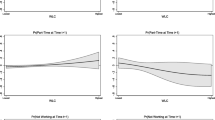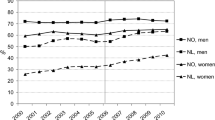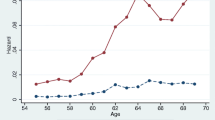Abstract
We examine the effect of depressive symptoms on the labor market outcomes of older Americans using the Health and Retirement Study (HRS). We take advantage of the longitudinal nature of the HRS from 1994 to 2008 and employ panel data methods to control for time-invariant, individual unobserved heterogeneity. Models that do not take into account individual heterogeneity show that depressive symptoms significantly reduce wages for males and females. In contrast, models that explicitly take into account individual heterogeneity through fixed effect estimation show no economic or statistically significant reduction in wages for those with depressive symptoms.


Similar content being viewed by others
Notes
Models with dichotomous outcome variables are estimated via OLS because of the ease of interpretation.
We also note the potential for reverse causality of depression in the wage equation. However, because of the potential for bias and inconsistency associated with weak instruments we investigated, we use OLS models and note that to the extent that lower wages may cause worse mental health, the population coefficient on depression should be less negative than indicated by our results [see Bound et al. 1995 for a general discussion of weak instruments and Chatterji et al. 2011 for a discussion in the specific context of mental health].
Other control variables that were investigated include: shocks to self-reported health, divorce shocks, spouse death shocks, the presence of health insurance, a quadratic in age, and 5-year incremental age splines. The key results regarding the relationship between depressive symptoms and labor market outcomes are robust to the inclusion of these other control variables.
One concern that may arise with fixed effects estimation is whether the insignificance of the fixed effects estimates is due to lack of variation in depressive symptoms across waves or because the fixed effect is controlling for time invariant attributes of the individual. The discussion surrounding Figure 1 suggests that there is individual level variation in depression over time. Furthermore, the standard errors in the fixed effect models are close to the same size as the OLS standard errors and are sometimes smaller. These two points suggest that the insignificance of depressive symptoms is attributable to individual specific factors.
References
Baldwin, Marjorie L., and Steven C. Marcus . 2007. Labor Market Outcomes of Persons with Mental Disorders. Industrial Relations: A Journal of Economy and Society, 46 (3): 481–510.
Barrick, Murray R., and Michael K. Mount . 1991. The Big Five Personality Dimensions and Job Performance: A Meta-Analysis. Personnel Psychology, 44 (1): 1–26.
Bartel, Ann, and Paul Taubman . 1979. Health and Labor Market Success: The Role of Various Diseases. The Review of Economics and Statistics, 61 (1): 1–8.
Bartel, Ann, and Paul Taubman . 1986. Some Economic and Demographic Consequences of Mental Illness. Journal of Labor Economics, 4 (2): 243–56.
Bono, Joyce E., and Timothy A. Judge . 2003. Core Self-Evaluations: A Review of the Trait and its Role in Job Satisfaction and Job Performance. European Journal of Personality, 17 (Supplement): S5–S18.
Bound, John, David A. Jaeger, and Regina M. Baker . 1995. Problems with Instrumental Variables Estimates when the Correlation between the Instruments and the Endogenous Explanatory Variable is Weak. Journal of the American Statistical Association, 90 (430): 443–450.
Chatterji, Pinka, Margarita Alegria, and David Takeuchi . 2011. Psychiatric Disorders and Labor Market Outcomes: Evidence from the National Comorbidity Survey-Replication. Journal of Health Economics, 30 (5): 858–68.
Clark, Lee A., David Watson, and Susan Mineka . 1994. Temperament, Personality, and the Mood and Anxiety Disorders. Journal of Abnormal Psycholog, 103 (1): 103–16.
Clark, Lee A., Jeffrey Vittengl, Dolores Kraft, and Robin B. Jarrett . 2003. Separate Personality Traits from States to Predict Depression. Journal of Personality Disorders, 17 (2): 152–172.
Cowell, Alexander J., Zhehi Luo, and Yuta J. Masuda . 2009. Psychiatric Disorders and the Labor Market: An Analysis by Disorder Profiles. The Journal of Mental Health Policy and Economics, 12 (1): 3–17.
Cseh, Attila . 2008. The Effects of Depressive Symptoms on Earnings. Southern Economic Journal, 75 (2): 383–409.
Drentea, Patricia . 2002. Retirement and Mental Health. Journal of Aging and Health, 14 (2): 167–194.
Emptage, Nicholas P., Roland Sturm, and Rebecca L. Robinson . 2005. Depression and Comorbid Pain as Predictors of Disability, Employment, Insurance Status, and Health Care Costs. Psychiatric Services, 56 (4): 468–474.
Ettner, Susan L., Richard G. Frank, and Ronald C. Kessler . 1997. The Impact of Psychiatric Disorders on Labor Market Outcomes. Industrial and Labor Relations Review, 51 (1): 64–81.
Frank, Richard, and Paul Gertler . 1991. An Assessment of Measurement Error Bias for Estimating the Effect of Mental Distress on Income. Journal of Human Resources, 26 (1): 154–164.
Gallo, William T., Elizabeth E. Bradley, Michele Siegel, and Stanislav V. Kasl . 2000. Health Effects of Involuntary Job Loss among Older Workers: Findings from Health and Retirement Study. The Journals of Gerontology: Psychological Sciences and Social Sciences, 55 (3): S131–S140.
Goodstein, Leonard D., and Richard I. Lanyon . 1999. Applications of Personality Assessment to the Workplace: A Review. Journal of Business and Psychology, 13 (3): 291–322.
Hasin, Deborah S., R. D. Goodwin, F. S. Stinson, and B. F. Grant . 2005. Epidemiology of Major Depressive Disorder: Results from the National Epidemiologic Survey on Alcoholism and Related Conditions. Archives of General Psychiatry, 62 (10): 1097–1106.
IMS Health. 2011. Top-Line Market Data. Available: http://www.imshealth.com (accessed August 9, 2013).
Irwin, Michael, Kamal Haydari Artin, and Michael N. Oxman . 1999. Screening for Depression in the Older Adult: Criterion Validity of the 10-Item Center for Epidemiological Studies Depression Scale (CES-D). Archives of Internal Medicine, 159 (15): 1701–04.
Jofre-Bonet, Mireia, Susan H. Busch, Tracy A. Falba, and Jody L. Sindelar . 2005. Poor Mental Health and Smoking: Interactive Impact on Wages. Journal of Mental Health Policy and Economics, 8 (4): 193–203.
Kessler, Ronald C., Patricia Berglund, Olga Demler, Robert Jin, Kathleen R. Merikangas, and Ellen E. Walters . 2005. Lifetime Prevalence and Age-of-Onset Distributions of DSM-IV Disorders in the National Comorbidity Survey Replication. Archives of General Psychiatry, 62 (6): 593–602.
Lindeboom, Maaren, France Portrait, and Gerard van den Berg . 2002. An econometric Analysis of the Mental-Health Effects of Major Events in the Life of Older Individuals. Econometrics and Health Economics, 11 (6): 505–520.
Luo, Zhehui, Alexander J. Cowell, Yuta J. Musuda, Scott P. Novak, and Eric O. Johnson . 2010. Course of Major Depressive Disorder and Labor Market Outcome Disruption. The Journal of Mental Health Policy and Economics, 13 (3): 135–149.
Mandal, Bidisha, and Brian Roe . 2008. Job Loss, Retirement and the Mental Health of Older Americans. The Journal of Mental Health Policy and Economics, 11 (4): 167–176.
Marcotte, Dave. E., Virginia Wilcox-Gök, and D. Patrick Redmon . 2000. The Labor Market Effects of Mental Illness: The Case of Affective Disorders. in The Economics of Disability, edited by D. Salkever, Greenwich, CT: JAI Press, pp. 181–210.
Midanik, Lorraine T., Krikor Soghikian, Laura J. Ransom, and Irene S. Tekawa . 1995. The Effect of Retirement on Mental Health and Health Behaviors: The Kaiser Permanente Retirement Study. The Journals of Gerontology Psychological Sciences and Social Sciences, 50B (1): S59–S61.
Tefft, Nathan . 2007. Mental Health and Employment: The SAD Story. iHEA 2007 6th World Congress: Explorations in Health Economics Paper. Available at SSRN, http://ssrn.com/abstract=966456.
Tennant, Christopher . 2001. Work-related stress and depressive disorders. Journal of Psychosomatic Research, 51 (5): 697–704.
Tett, Robert P., Douglas N. Jackson, and Mitchell Rothstein . 1991. Personality Measures as Predictors of Job Performance: A Meta-Analytic Review. Personnel Psychology, 44 (4): 703–42.
Tian, Haijun, L. Robinson Rebecca, and Sturm Roland . 2005. Labor Market, Financial, Insurance and Disability Outcomes among Near Elderly Americans with Depression and Pain. The Journal of Mental Health Policy and Economics, 8 (4): 219–228.
US Department of Health and Human Services. 2008. Depression in the United States Household Population, 2005–2006. NCHS Data Brief No. 7, http://www.cdc.gov/nchs/data/databriefs/db07.pdf (accessed August 9, 2013).
Wallace, Robert B., A. Regula Herzog, Mary Beth Ofstedal, Diane Steffick, Stephanie Fonda, and Ken Langa . 2000. Documentation of Affective Functioning Measures in the Health and Retirement Study. HRS/AHEAD Documentation Report, Ann Arbor, Michigan: Survey Research Center, University of Michigan.
Watson, David, and Lee A. Clark . 1995. Depression and the Melancholic Temperament. European Journal of Personality, 9 (5): 351–366.
Wooldridge, J.M . 2002. Econometric Analysis of Cross Section and Panel Data. Cambridge: MIT Press.
Wray, L.A . 2003. Mental Health and Labor Force Exits in Older Workers: The Mediating or Moderating Roles of Physical Health and Job Factors. Working Papers, Ann Arbor, Michigan: University of Michigan, Michigan Retirement Research Center.
Author information
Authors and Affiliations
Appendix
Rights and permissions
About this article
Cite this article
Koford, B., Cseh, A. Older Americans, Depression, and Labor Market Outcomes. Eastern Econ J 41, 70–85 (2015). https://doi.org/10.1057/eej.2013.37
Published:
Issue Date:
DOI: https://doi.org/10.1057/eej.2013.37




